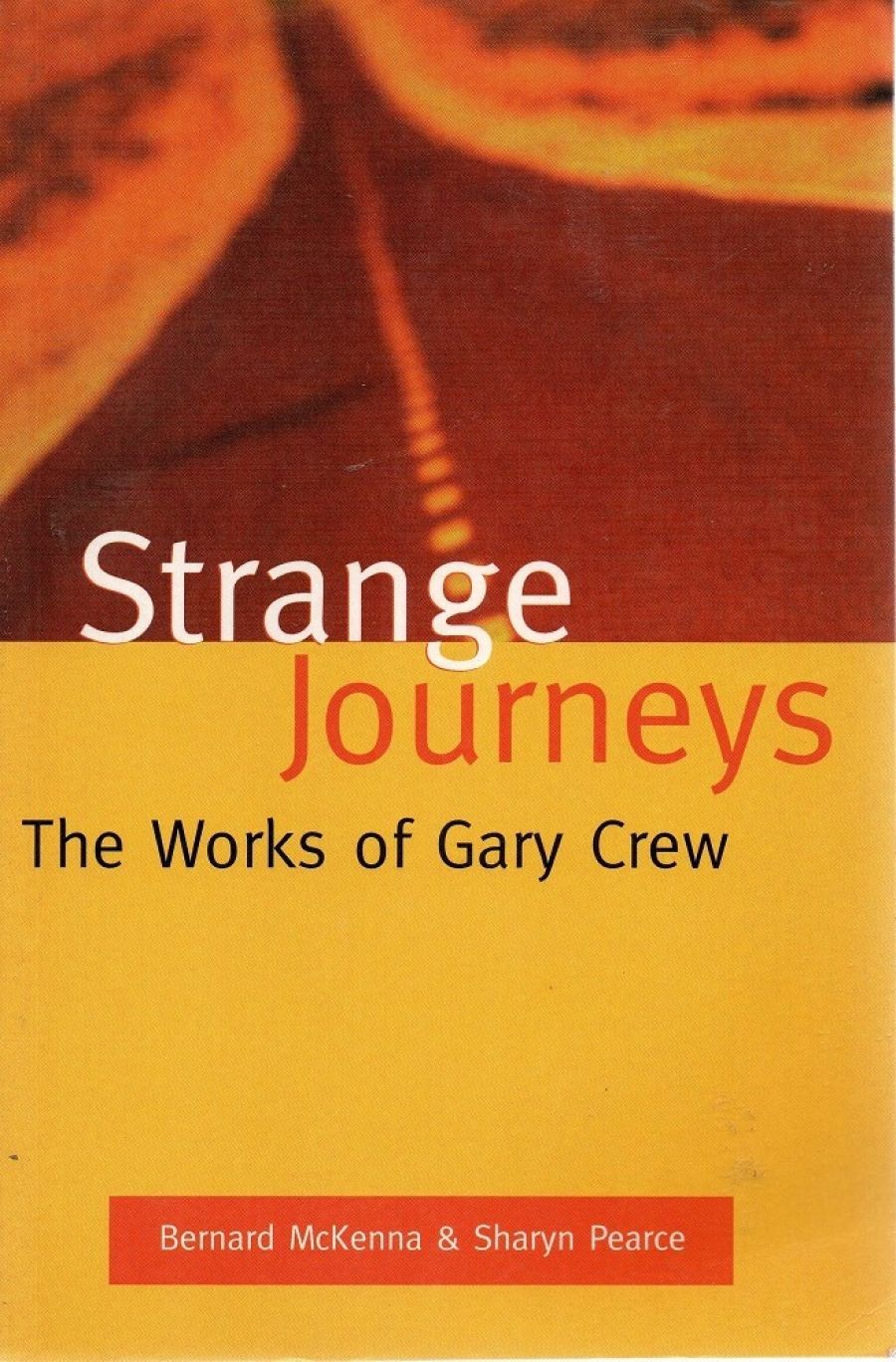
- Free Article: No
- Contents Category: Commentary
- Review Article: Yes
- Online Only: No
- Custom Highlight Text:
All too few books about Australian children’s writers and writing manage to find a publisher. They’re unlikely to sell enough copies, is the standard explanation. All the more reason, therefore, to welcome an even greater rarity – a book which focuses on the work of a single writer. Even if Gary Crew might not necessarily be everyone’s first choice as the subject of such a volume, all those interested in Australian children’s literature will hope that Strange Journeys meets with a success which will encourage the publication of similar analyses of other contemporary writers’ work.
- Book 1 Title: Strange Journeys
- Book 1 Subtitle: The works of Gary Crew
- Book 1 Biblio: Hodder & Stoughton, $29.95 pb, 240 pp
The detailed treatment of Crew’s eight novels which follows is, for the most pan, critically well balanced, if not fired with special insights, but there’s an odd and unnecessary emphasis throughout on Crew’s virtuous working habits. We’re often told ‘he spent many weeks reading about’ or researching a subject, as if his application to the task were ever in doubt. On the other hand, we get a good understanding of the pressing nature of Crew’s desire to create books which are ‘literary, in the best sense of the word, and also have popular appeal’. The authors successfully emphasise and illustrate Crew’s oft-stated wish to base his novels ‘on plot which nevertheless carries a subtext’. That subtext is often cross-cultural understanding, a subject about which Crew is shown to care deeply.
Though much of the book is obviously based on Crew’s own input, via his longstanding acquaintance with McKenna and Pearce, there’s often a strange tentativeness of expression, shown in statements like ‘it is strongly probable that [Crew] shares [Wilson] Harris’s views about the role of fantastical imagery’, and ‘it appears that Crew has based his novel upon the nine lessons of the office of the Virgin’. Given their closeness to him, the authors could surely have consulted with Crew to remove any doubt.
On other occasions, the authors’ closeness seems to have given them a certainty which isn’t immediately obvious, to me at least. They quote, for example, his reaction to views hostile to nihilism in contemporary novels for teenagers, specifically Maurice Saxby’s declaration that authors are obliged to supply hope, direction and inspiration to their readers:
What books are doing today is they are diagnosing a society that has gone wrong. That’s very corrupt in many ways; it’s all very well to diagnose but you have to point the way forward. Books should be an inspiration, which doesn’t mean you show everything as being rosy and sweet, but no matter how hard things are, you can pick yourself up and get on with life.
That’s an interesting enough view, leaving plenty of room for debate, but if it’s a ‘succinct’ reaction, as the authors assert, then their definition of the word is very different from mine.
I suspect that my notion of what constitutes ‘over-intellectualising’ is also different from theirs. Though McKenna and Pearce show in their discussion of Inventing Anthony West, the slightest novel in Crew’s oeuvre, that they’re aware of the danger of over-intellectualising it, the fact is that the whole of Strange Journeys goes very close to over-intellectualisation, even in its treatment of Inventing Anthony West.
As a result, it’s easy to come to the conclusion that, given the depth of his concerns, Crew might be better off writing for adults. The authors certainly don’t grapple with the possibility that over-intellectualisation may be one of the reasons why some readers grumble about Crew’s work. Indeed, there’s a marked reluctance throughout to acknowledge, let alone deal with, criticism of Crew’s novels. Reviews are quoted, but they’re never very critical ones, giving the impression that the books have been universally warmly received. This undermines the claims of Strange Journeys to be a serious study.
The book’s stature is also undermined by skimpy editing. Commas are frequently absent or misplaced and, for the work of two academics, there’s a surprising number of grammatically ill-constructed sentences. In the end, the true measure of success for a book like Strange Journeys is the extent to which it encourages readers to revisit the subject’s work in search of previously unnoticed riches. Regrettably, I, at least, was not so encouraged by Strange Journeys.


Comments powered by CComment